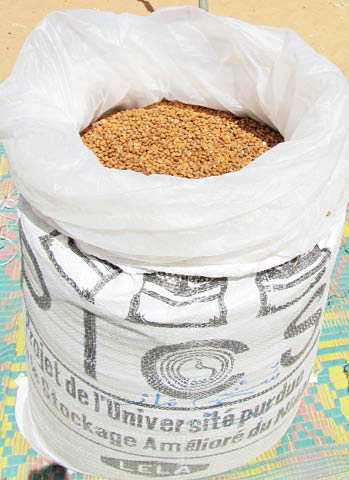A leading agricultural firm, Syngenta Foundation Nigeria (SFN), has embarked on a massive sensitisation programme for farmers on the benefits of using the Purdue Improved Crop Storage (PICS) bag following the recent federal government’s disclosure that the total cost of post-harvest annual losses in the country’s agriculture industry was N3.5 trillion.
The PICS bag is a technology that helps to improve food security, mitigate post-harvest losses and increase incomes of smallholder farmers around the world.
2023: Atiku pledges state police if elected
Economy: How Nigeria became a laggard among peers
Some of these sensitisation workshops were carried out by the foundation across Bunkure, Bichi, and Tofa local government areas of Kano State.
This came at the heels of the statement credited to the Minister of State for Agriculture and Rural Development, Mustapha Shehuri, that the post-harvest losses had assumed a worrisome situation that threatens Nigeria’s food security.
“The economic cost of post-harvest losses as reported by our partner, Action Aid, indicates that N3.5 trillion is lost annually,” the minister had stated.
As part of Syngenta Foundation’s contribution in ameliorating the menace, SFN’s country manager, Gabriel Isaiah Alunyo, said the PICs bag was developed by Purdue University for the storage of dry grain, especially cowpea, adding, “In recent times the low-cost technology has been found to be effective for all grain types and even other products.”
He also said, “This bag is an innovative technology that mitigates post-harvest losses in the storage of gains; hence the foundation’s decision to embark on the sensitisation mission.”
He maintained that food security was core to every country; and it is not just about food availability, but food safety and its access.
Also speaking, Mojisola Oluwafemi, the project assistant for Seed2B at Syngenta Foundation, further explained that the PICS was a triple layer sealed plastic bag that cuts off the oxygen supply to create hermetic conditions, thereby eliminating insect damage in storing dry grain.
She said, “Farmers, both smallholders and those on large scale, can store varieties of legume and cereal crops in the PICS bag for more than one year after harvest without the use of chemicals. The bag gives the flexibility for farmers to store grains and sell when the prices go up.
“The bag is also very important in having chemical-free healthy food to feed the family.”
She noted that the bag came in different sizes but “common around us is the 100kg and 50kg, which have three layers, two liners fitted inside a woven sack.”

 Join Daily Trust WhatsApp Community For Quick Access To News and Happenings Around You.
Join Daily Trust WhatsApp Community For Quick Access To News and Happenings Around You.